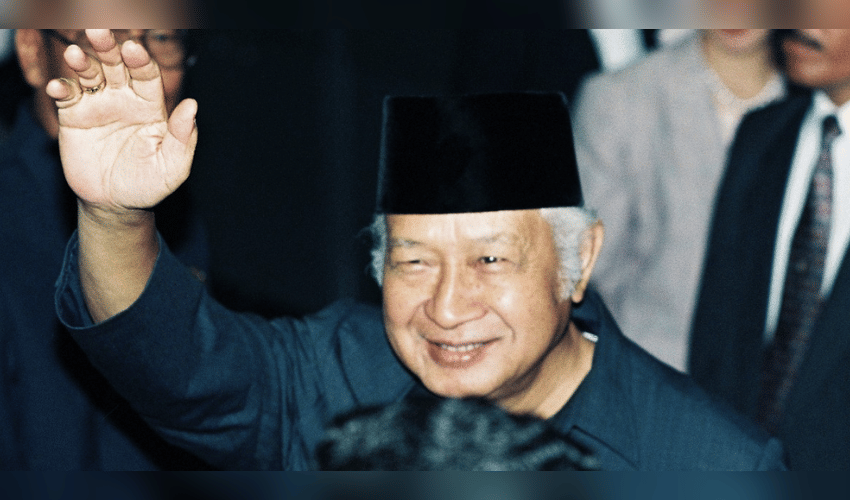Asia In News
Indonesia honors late former President Suharto with the title of national hero

Indonesia has bestowed the title of national hero on its former president, Suharto, a move that has sparked outrage and reopened old wounds from one of the country’s darkest chapters. The honor was announced on Monday (Nov 9) during a ceremony led by President Prabowo Subianto — Suharto’s former son-in-law — despite widespread protests from pro-democracy groups and families of victims who suffered under his authoritarian regime. Suharto, who ruled Indonesia for more than three decades before being forced from power in 1998, was accused of widespread human rights abuses, corruption, and nepotism.
During the ceremony at the state palace in Jakarta, Prabowo presented the award to Suharto’s daughter and son. “A prominent figure from Central Java and a hero of the independence struggle, General Suharto stood out since the early days of Indonesia’s freedom,” the announcer declared. The award, which recognizes citizens who have made major contributions to the country since its independence in 1945, was given to ten Indonesians this year, including Suharto, who died in 2008.
Suharto, a military officer, rose to power in 1967 after seizing control from Indonesia’s first president, Sukarno. His rule brought economic growth and relative stability, but it was also defined by political repression and a culture of corruption that benefited his family and close allies. His leadership ended abruptly in 1998 after violent protests during the Asian financial crisis forced him to resign, leaving behind a country in economic and social turmoil. Before the ceremony, Suharto’s portrait — showing him in military uniform — was displayed among the other honorees at the state palace. His picture stood between those of former president Abdurrahman Wahid and labor activist Marsinah, who had been kidnapped and killed during Suharto’s rule.
The decision to honor Suharto has divided the nation. Activists and survivors of his regime see it as an attempt to rewrite history and erase the suffering of those who opposed him. Demonstrations took place in Jakarta ahead of the announcement, with protesters holding banners condemning what they described as “historical whitewashing.” Among them was Tadius Priyo Utomo, a 47-year-old activist who flew from East Timor to join the protest. “Our past struggles are being ignored,” he said. “We fought against Suharto’s dictatorship, and now he’s being celebrated as a hero.”
Under Suharto’s rule, Indonesia invaded East Timor in 1975 and annexed it soon after, maintaining a harsh military occupation that lasted until his downfall. East Timor eventually gained independence in 2002. Suharto’s government also used the military to suppress dissent across Indonesia, silencing critics and jailing opponents. Despite repeated allegations of massive corruption and human rights violations, he was never prosecuted, as he remained shielded by his political connections and poor health in his later years.
For many Indonesians, the decision to award Suharto the title of national hero reflects the growing influence of his former allies within the current administration. President Prabowo, once married to Suharto’s daughter and a former special forces commander under his rule, has himself faced accusations of human rights abuses in East Timor — allegations he has consistently denied. Critics like Marzuki Darusman, a former attorney general and head of the 1998 riots investigation, warn that the move could signal a return to military dominance in politics. “Prabowo can do everything Suharto did because he is now protected by his heroism,” Darusman said, referring to the increasing role of the military since Prabowo took office.
Suharto’s political legacy continues to shape modern Indonesia. His former party, Golkar, remains one of the country’s most powerful political forces and is a key supporter of Prabowo’s government, holding several influential cabinet positions. Political analyst Kevin O’Rourke, author of Reformasi: The Struggle for Power in Post-Soeharto Indonesia, said naming Suharto a national hero risks sanitizing history and undermining Indonesia’s democratic progress. “It’s not easy to put democracy back in the box once people have lived with it,” he said, noting that half of Indonesia’s population is too young to remember Suharto’s era but still lives with its consequences.
For those who remember, the pain remains fresh. Every Thursday for nearly two decades, members of a group known as Aksi Kamisan have gathered silently outside the presidential palace, dressed in black, demanding justice for those who disappeared or were killed during Suharto’s rule. Many still have no answers about what happened to their loved ones. Government officials have defended the decision to honor Suharto. Culture Minister Fadli Zon stated that thorough research was conducted before granting the title and that Suharto met all the necessary criteria. He also dismissed claims that Suharto was responsible for the mass killings of 1965, in which an estimated half a million people were killed during the anti-communist purges that brought him to power. Indonesia has never formally investigated those killings, leaving one of the country’s darkest periods officially unresolved.



